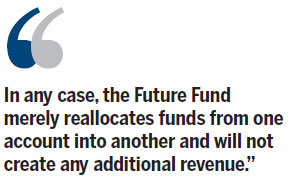'Future Fund' not a solution to impending budget deficit
Updated: 2014-03-03 07:00
By Ho Lok-Sang(HK Edition)
|
|||||||||
I have expressed my worries about fiscal sustainability in Hong Kong before in this column. The recent budget has only added to my concerns. Its unfairness to the middle class is also a serious problem.
The financial secretary has devoted quite a few paragraphs in his budget speech to the subject of fiscal discipline. He said: "It is incumbent upon the government to strictly contain the growth of expenditure ... We should uphold fiscal discipline, and put in place more vigorous internal controls and a monitoring mechanism for assessing and prioritizing competing funding priorities with appropriate offsettings from different programs ... government departments and the public sector should conduct expenditure reviews and introduce efficient measures with a view to doing more with less."
John Tsang then went on to talk about "preserving the revenue base" and "saving for the future". While he said he would not rule out increasing tax revenue, he also said it will be controversial to propose any new taxes. For that reason, Tsang did not make any proposal to that effect. He will only raise some fees on various items charged by the government. Finally the financial secretary discussed the subject of the "Future Fund", which comprises the Land Fund and a portion of future surpluses. "The government may draw on this contingency fund in the event of a sustained budget deficit to finance strategic infrastructure projects conducive to Hong Kong's future economic development."

Asked about this by reporters, the financial secretary said that sometimes in the past, when facing a huge budget deficit, the government had to put some infrastructure projects on hold. This raised two questions: First, why should the government hold back worthwhile infrastructure projects when it still has a rather big fiscal surplus to act as a buffer? Second, does he intend the Future Fund to be used for infrastructure projects? It is not clear why a Future Fund is needed to fund infrastructure projects when there are still large reserves, and why inventing a new account will help promote fiscal discipline?
In any case, the Future Fund merely reallocates funds from one account into another and will not create any additional revenue. Given that Tsang and his taskforce on long-term fiscal planning has warned about an impending structural deficit, which he warned could happen in seven years, he really should find new revenue sources to cover the emerging shortfall. The government should be proactive in preventing the emergence of a structural deficit. It will be too late to contain the problem when a structural deficit has already occurred.
The fact is fiscal surpluses in the past four fiscal years are respectively HK$75.1 billion, HK$73.7 billion, HK$64.8 billion, and HK$12 billion, clearly indicating a worsening trend. Moreover, the effects of the Low-Income Working Family Allowance, which will take effect from 2015-16, have not yet kicked in, while the outlook for profits tax is not good at all. This current year achieved a budget surplus largely because the government managed to sell much more land at prices that have not factored in the recent pessimism over the housing market outlook. With housing prices rapidly declining, it is quite likely land premiums will be much lower than expected.

Then there is the issue of the increasing discontent of the middle class. The middle class comprises tax-paying employees and their families who have good reasons to complain. Not only are they not getting any of the specific reliefs or benefits targeted at the lower-income group, but they are also being pushed to higher-income tax brackets by inflation. Although there is still some relief in the form of rates relief and a salary tax refund of 75 percent, up to HK$10,000, rates relief often benefit landlords rather than tenants. There is, indeed, a case at least to index the tax bands and the personal allowance against inflation. This is not tax relief, but merely a technical add-on to avoid effectively taxing middle-class families more heavily over time due to inflation.
Tsang speaks as if raising some fees here and there, and improving efficiency among civil servants, are sufficient to contain government expenditure to 20 percent of GDP. There is clearly a limit as to how much additional productivity can be squeezed out of the civil servants. Fees, too, cannot be raised indefinitely. In the absence of additional revenue sources, balancing the budget over the long run would require cutting back on expenditures where the resistance is lowest. But this would be ignoring the social cost of such cutbacks.
There is nothing sacrosanct about containing public expenditures to no more than 20 percent of the GDP. The relevant question is whether additional spending representing 1 percent of GDP brings more benefits than costs. If benefits outweigh costs, the additional spending is well justified. The government should then tell the public that the additional spending is good and present the evidence. The same logic applies to cutting back spending as well.
The author is director of the Center for Public Policy Studies at Lingnan University.
(HK Edition 03/03/2014 page9)